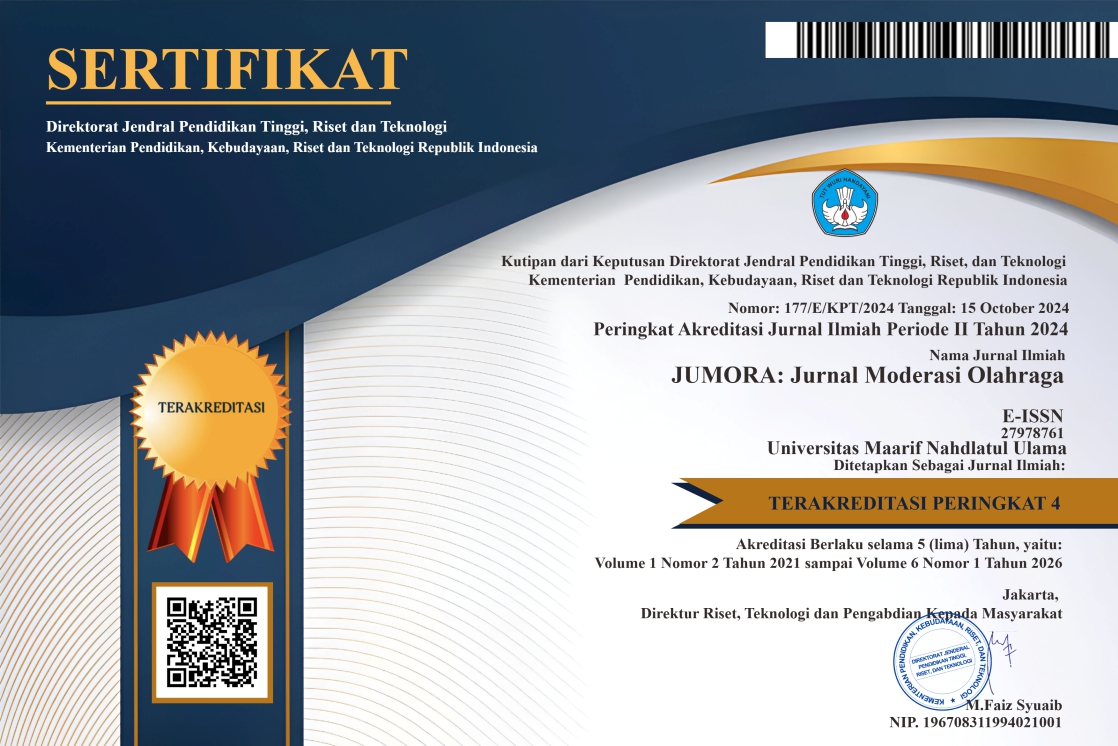Genally Application Development in Adaptive Physical Education Learning Courses in the Independent Curriculum
DOI:
https://doi.org/10.53863/mor.v2i2.518Keywords:
Genally Application, Adaptive Physical Education, Independent CurriculumAbstract
This study aims to produce adaptive physical education learning products through general application in an independent curriculum. Lecturers can choose various teaching tools to adapt learning to the needs and interests of students. Projects to strengthen the achievement profile of Pancasila students are developed based on certain themes determined by the government. The method used is research and development, so data collection is supported by primary sources from sports research and development books and relevant research results. Because this study uses a qualitative approach, the instruments used in collecting research information are references found by the researchers themselves that are relevant to be presented in this study. Data analysis used small-scale tests and large-scale tests. Data reduction is used in the findings of expert statements and research published through articles. Then explained in short sentences. In the end, I obtained a conclusion statement from a conceptual study of research and development in sports science. The results of research on a limited scale by 30 sixth-semester students of the Physical Education, Health, and Recreation study program with 16 questions show 86% in the "Very Good" category. And for further research, hopefully, genially learning can develop in the world of education with researchers who want to take this title as well as effectively and efficiently.
Keywords: Genally Application, Adaptive Physical Education, Independent Curriculum
References
Alismail, H. A., & McGuire, P. (2015). 21 St Century Standards and Curriculum: Current Research and Practice. Journal of Education and Practice, 6(6), 150–155. http://files.eric.ed.gov/fulltext/EJ1083656.pdf
An, Y. J., & Cao, L. (2017). The Effects of Game Design Experience on Teachers’ Attitudes and Perceptions regarding the Use of Digital Games in the Classroom. TechTrends, 61(2), 162–170. https://doi.org/10.1007/s11528-016-0122-8
Borrego, C., Fernández, C., Blanes, I., & Robles, S. (2017). Room escape at class: Escape games activities to facilitate the motivation and learning in computer science. Journal of Technology and Science Education, 7(2), 162–171. https://doi.org/10.3926/jotse.247
Botturi, L., & Babazadeh, M. (2020). Designing educational escape rooms: Validating the star model. International Journal of Serious Games, 7(3), 41–57. https://doi.org/10.17083/ijsg.v7i3.367
Enstein, J., Citra, U., Vera, B., Bulu, R., Roswita, B., & Nahak, L. (2022). Pengembangan Media Pembelajaran Game Edukasi Bilangan Pangkat dan Akar menggunakan Genially. Jurnal Jendela Pendidikan, 02(01), 101–109.
Erfayliana, Y., Demirci, N., & Demirci, P. T. (2022). Developing Online Modules for Educators in Fifth Grade Physical Education Class. JUMORA: Jurnal Moderasi Olahraga, 2(1), 23–37. https://doi.org/10.53863/mor.v2i1.420
Eukel, H. N., Frenzel, J. E., & Cernusca, D. (2017). Educational gaming for pharmacy students - Design and evaluation of a diabetes-themed escape room. American Journal of Pharmaceutical Education, 81(7). https://doi.org/10.5688/ajpe8176265
Halidjah, S., & Pranata, R. (2022). Comic Media Development in Thematic Learning For Elementary School Students. 4(1), 1–10.
Hermita, N., Putra, Z. H., Alim, J. A., Wijaya, T. T., Anggoro, S., & Diniya, D. (2021). Elementary Teachers’ Perceptions on Genially Learning Media Using Item Response Theory (IRT). Indonesian Journal on Learning and Advanced Education (IJOLAE), 4(1), 1–20. https://doi.org/10.23917/ijolae.v4i1.14757
Ho, A. M. (2018). Unlocking Ideas: Using Escape Room Puzzles in a Cryptography Classroom. Primus, 28(9), 835–847. https://doi.org/10.1080/10511970.2018.1453568
Juniarta, A. T., & Winarno, M. . (2016). Pengembangan Instrumen Penilaian Pengetahuan Mata Pelajaran Pendidikan. Jurnal Pendidikan, 1(7), 1449–1463.
Habaridota, M. L. B. (2018). The Development of Comic Learning Media in Primary Teacher Education’s Students of FKIP Untan. JP2D (Jurnal Penelitian Pendidikan Dasar) UNTAN, 1(3), 110-119.
Martín-García, A. V. (2020). Blended Learning: Convergence between Technology and Pedagogy. In Lecture Notes in Networks and Systems 126 (Vol. 126). http://link.springer.com/10.1007/978-3-030-45781-5
Mustafa, P. S., & Winarno, M. E. (2020). Pengembangan Buku Ajar Pengajaran Remedial Dalam Pendidikan Jasmani Untuk Mahasiswa S1 Pendidikan Jasmani Dan Kesehatan Universitas Negeri Malang. Multilateral Jurnal Pendidikan Jasmani Dan Olahraga, 19(1). https://doi.org/10.20527/multilateral.v19i1.7629
Permatasari, S. V. G., Pujayanto, P., & Fauzi, A. (2021). Pengembangan E-Modul Pembelajaran Interaktif Menggunakan Aplikasi Genially Pada Materi Gelombang Bunyi dan Cahaya Berbasis Model VAK Learning. Jurnal Materi Dan Pembelajaran Fisika, 11(2), 96. https://doi.org/10.20961/jmpf.v11i2.49235
Purnomo, I., Tomoliyus, T., & Burhaein, E. (2019). Development of Learning Activities Playing a Ball on a Goal To Improve Manipulative Skills For Lower Class Students. https://doi.org/10.4108/eai.19-10-2018.2281716
Ratno Susanto, R. (2019). Students Critical Thinking Ability in Tennis Mathematics of Physical Health Education and Recreation. International Journal of Scientific and Research Publications (IJSRP), 9(9), p9371. https://doi.org/10.29322/ijsrp.9.09.2019.p9371
Salenussa, B. J. M., Suriani, Yufiati, & Mataheru, N. M. (2019). Development of integration education model pela-gandong local based on local content in primary schools in Ambon City. International Journal of Recent Technology and Engineering, 8(2 Special Issue 9), 118–127. https://doi.org/10.35940/ijrte.B1027.0982S919
Sari, W. N., & Ahmad, M. (2021). Pengembangan Media Pembelajaran Flipbook Digital di Sekolah Dasar. Edukatif : Jurnal Ilmu Pendidikan, 3(5), 2819–2826. https://edukatif.org/index.php/edukatif/article/view/1012
Susanto, R., Afandi, A., & Irmawati, F. (2022). The Effectiveness of Flipbook Learning in Sports Physiology Courses Improves Student Achievement In the course of the Pandemic. JUMORA: Jurnal Moderasi Olahraga, 2(1), 67–76. https://doi.org/10.53863/mor.v2i1.411
Susanto, R., & Lestari, S. (2020). European Journal of Education Studies The Effect of Flipbook-Based Field Teaching Materials with Anchored Instruction Model to Improve Students’ Critical Thinking Skills. European Journal of Education Studies, 7(12), 642–652. https://doi.org/10.46827/ejes.v7i12.3475
Winarno. (2013). Buku Metodologi Penelitian Kualitatif. Universitas Negeri Malang (UM Press).
Downloads
Published
How to Cite
Issue
Section
License
Copyright (c) 2022 Ratno Susanto Ratno;Achmad Afandi

This work is licensed under a Creative Commons Attribution-ShareAlike 4.0 International License.
Authors retain copyright and grant the journal right of first publication with the work simultaneously licensed under a Creative Commons Attribution-ShareAlike 4.0 International License that allows others to share the work with an acknowledgment of the work’s authorship and initial publication in this journal











